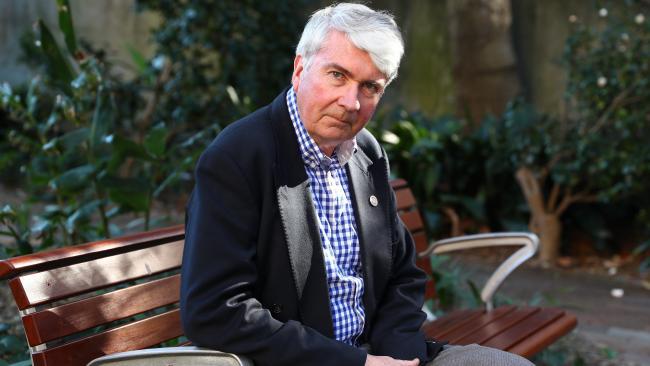|
Priest Frank Brennan warns he will defy confessional crackdown
By John Ferguson
Australia’s best credentialed priest on legal matters will defy any new laws to convict Catholic clergy for breaking the seal of the confessional on child sex abuse but gravely doubts he will ever be confronted with this dilemma. Father Frank Brennan, a Jesuit priest and professor of law at the Australian Catholic University, yesterday rejected recommendations by the Royal Commission into Institutional Responses to Child Sexual Abuse that would force priests — under the threat of criminal sanctions — to break the confessional confidence of offenders. Under the church’s canon law, priests must maintain secrecy about sins that a person confesses in a manner sometimes compared with client-lawyer confidentiality but in a holy context it is considered an untouchable imperative. But the royal commission headlined its 85 recommendations in its long criminal justice report on a crackdown on one of the church’s central pillars. Father Brennan said if the law were to be introduced in Australia his only options as a priest would be to stop hearing confessions or to defy any legislation that sought to break the seal of confidentiality. Father Brennan’s position was backed yesterday by the nation’s most senior bishops but rejected by the church’s Truth, Justice and Healing Council, which had previously argued the seal should remain intact. Father Brennan said he would not adhere to any legislative changes, although he stressed that in nearly 32 years as a priest no one in the church had confessed sexual abuse to him in the confessional. ‘‘And if there is a law that says that I have to disclose it, then yes, I will conscientiously refuse to comply with the law,’’ Father Brennan told The Australian. ‘‘All I can say is that in 32 years no one has ever come near me and confessed anything like that. And instituting such a law, I say, simply reduces rather than increases the prospect that anyone ever will come and confess that to me.’’ The commission’s justice report recommends making the failure to report child sex abuse in institutions a criminal offence and recommends sentences for child abuse be set by the standard at the time of sentencing. However, the sentence must be limited to the maximum sentence available for the offence at the date when the offence was committed. It calls for a crackdown on child grooming, for victims to get a better deal from police and the courts and outlines ways to minimise delays in the legal system. Its recommendations also include improved police investigations and training. The commission was clear that it wanted to clamp down on the church and the confessional, even though there are markedly fewer people attending confession this year compared with previous decades. More broadly, it varies from state to state which occupations demand mandatory reporting but the most common include teachers, doctors, nurses, and police, according to the federal government. The most extensive reporting lists are in NSW, Victoria, South Australia, Tasmania and the ACT. Australian Catholic Bishops Conference president Archbishop Denis Hart said the church could not accept such a reform to the confessional but remained committed to reporting child sex offences. “Confession in the Catholic Church is a spiritual encounter with God through the priest,’’ he said. “It is a fundamental part of the freedom of religion, and it is recognised in the law of Australia and many other countries. It must remain so here in Australia. “Outside of this all offences against children must be reported to the authorities, and we are absolutely committed to doing so.” The commission yesterday defended its recommendations, declaring: “Clergy should not be able to refuse to report because the information was received during confession. “Persons in institutions should report if they know, suspect or should have suspected a child is being or has been sexually abused. “The royal commission heard of cases in religious settings where perpetrators who made a religious confession to sexually abusing children went on to reoffend and seek forgiveness. The report recommends there be no exemption, excuse, protection or privilege from the offence granted to clergy for failing to report information disclosed in connection with a religious confession.’’ Father Brennan also said the commission had cited examples that weren’t relevant to the broad imperative of whether the confessional seal should be broken. Truth, Justice and Healing Council chief executive Francis Sullivan said that while the church and the council had argued that reporting provisions should not apply to the confessional, the commission’s recommendations should be respected. “The whole concept of confession in the Catholic Church is built on repentance, forgiveness and penance,” Mr Sullivan said. “If a child sex abuser is genuinely seeking forgiveness through the sacrament of confession they will need to be prepared to do what it takes to demonstrate their repentance. “Part of this forgiveness process, certainly in the case of a child sex abuser, would normally require they turn themselves in to the police. In fact the priest can insist that this is done before dispensing absolution. “If ultimately there are new laws that oblige the disclosure of information heard in the confessional, priests, like everybody else, will be expected to obey the law or suffer the consequences. “If they do not this will be a personal, conscience decision, on the part of the priest that will have to be dealt with by the authorities in accordance with the new law as best they can.’’
|
.
Any original material on these pages is copyright © BishopAccountability.org 2004. Reproduce freely with attribution.
